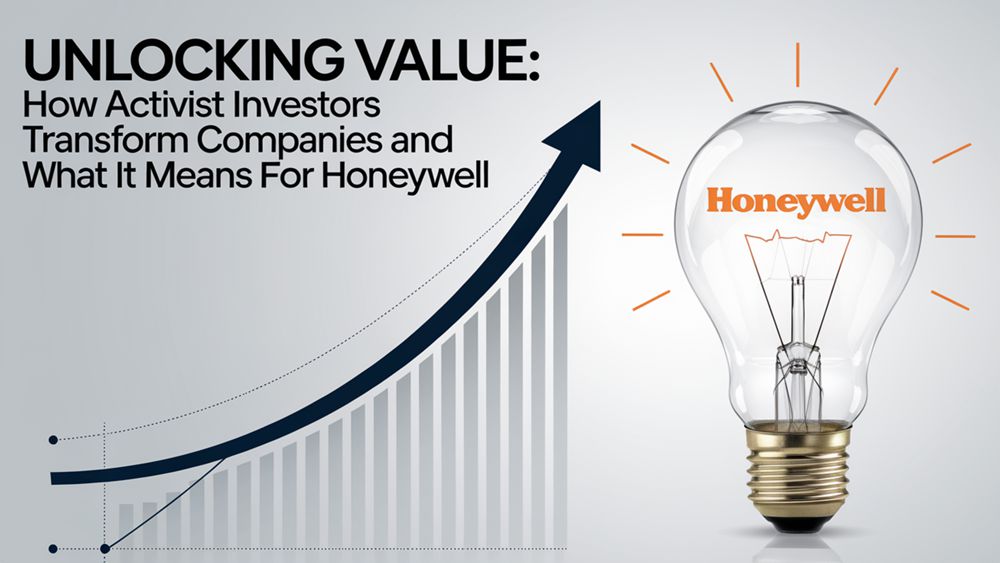Unlocking Value: How Activist Investors Transform Companies and What It Means for Honeywell

The Activist Investor Playbook: Buying and Splitting Businesses
Activist investors are not your typical shareholders. They actively engage with company management and boards to push for changes they believe will enhance shareholder value. One of their most effective strategies is advocating for the breakup of conglomerates into more focused, standalone entities. Here’s how this strategy works:
1. Increased Transparency and Focus
When a conglomerate is split into independent units, each division can operate with greater transparency and focus. This separation allows investors to assess the financial performance and growth potential of each unit more accurately. For instance, in the case of Boeing, a breakup could allow its Commercial Airplanes division to concentrate solely on aircraft innovation, while its Defense & Space division could focus on government contracts and aerospace technologies.
2. Operational Efficiency
Breaking up a large corporation into smaller, specialized entities can lead to improved operational efficiency. Each unit can hone in on its core strengths without the distractions and complexities of a larger corporate structure. This targeted approach often results in better resource allocation and streamlined operations.
3. Market Specialization
Different divisions of a conglomerate can appeal to distinct investor bases. For example, a company’s aerospace segment might attract growth-focused investors, while its automation segment could appeal to those seeking stability. This specialization can enhance the overall market appeal of the separated entities.
4. Historical Success Stories
The strategy of breaking up conglomerates has historical precedents. General Electric’s recent three-way split is a notable example, where the spun-off companies experienced significant increases in market capitalization. This success story underscores the potential benefits of strategic separations.
5. Potential Upside
Activist investors often highlight the potential upside of a breakup. For instance, Elliott Management has indicated that a breakup of Honeywell could lead to a 51% to 75% increase in the company’s stock price over the next two years. This projection is based on the belief that each standalone entity would be better positioned to capitalize on market opportunities.
Elliott’s Vision for Honeywell: A Strategic Breakup
Elliott Investment Management’s recent acquisition of a substantial stake in Honeywell is a textbook example of activist investing in action. The firm is advocating for the separation of Honeywell’s aerospace and automation businesses into standalone companies. Here’s how this could play out:
1. Aerospace and Automation as Independent Entities
Elliott’s proposal envisions Honeywell Aerospace and Honeywell Automation operating as independent entities. This separation would allow each business to pursue tailored growth strategies and focus on its specific market dynamics. The aerospace division, described as the “crown jewel” of Honeywell, could benefit from increased investment and innovation, while the automation division could streamline its operations and enhance its market position.
2. Simplified Strategies and Improved Performance
By becoming standalone companies, Honeywell’s divisions could implement simplified strategies and improve their operational performance. This focus could lead to better capital allocation, enhanced oversight, and more effective management, ultimately driving shareholder value.
3. Market Reaction and Investor Confidence
The market has responded positively to Elliott’s proposal, with Honeywell’s stock reaching an all-time high following the announcement. This surge reflects investor confidence in the potential benefits of the breakup and the strategic vision outlined by Elliott.
4. Aligning with Industry Trends
Elliott’s push for a breakup aligns with broader trends in the industrial sector, where companies like General Electric and 3M have successfully executed similar strategies. These moves have demonstrated the value of focusing on core competencies and optimizing portfolios.
The Broader Impact of Activist Investors
Activist investors like Elliott Management play a crucial role in reshaping companies and unlocking value. Their involvement often signals a potential turnaround, influencing market perceptions and driving stock price increases. Here are some key takeaways from the broader impact of activist investors:
1. Driving Strategic Changes
Activist investors advocate for strategic changes that can enhance company value. These changes may include cost-cutting measures, restructuring, and improvements in corporate governance. By pushing for these initiatives, activists can help underperforming companies improve their financial performance.
2. Enhancing Shareholder Value
The ultimate goal of activist investors is to enhance shareholder value. By advocating for changes that improve operational efficiency and market positioning, activists can drive stock prices higher, resulting in financial gains for both the investors and the companies involved.
3. Signaling Market Confidence
The involvement of activist investors often signals market confidence in a company’s potential for improvement. This confidence can lead to increased investor interest and a positive impact on stock prices.
4. Potential Risks and Challenges
While activist involvement can lead to positive outcomes, it also comes with potential risks and challenges. Conflicts between activists and company management can create negative narratives and impact shareholder confidence. It’s essential for companies to navigate these dynamics carefully to achieve the desired outcomes.
Conclusion: A Forward-Looking Perspective
As Elliott Investment Management pushes for a breakup of Honeywell, the potential for unlocking value is significant. By separating the aerospace and automation divisions, Honeywell could enhance its operational efficiency, focus on core strengths, and appeal to distinct investor bases. This strategic move aligns with industry trends and has the potential to drive substantial shareholder value.
For individual investors, the Honeywell case offers valuable insights into the power of activist investing. By understanding the strategies and motivations of activist investors, investors can make informed decisions and potentially capitalize on opportunities for growth and value creation.
As the story unfolds, it will be interesting to see how Honeywell navigates this transformative period and whether Elliott’s vision for the company comes to fruition. In the ever-evolving world of finance, one thing is certain: activist investors will continue to play a pivotal role in shaping the future of companies and unlocking hidden value.
Send us a Message
Contact us
Contact us today to learn more about Kavout's products or services.

